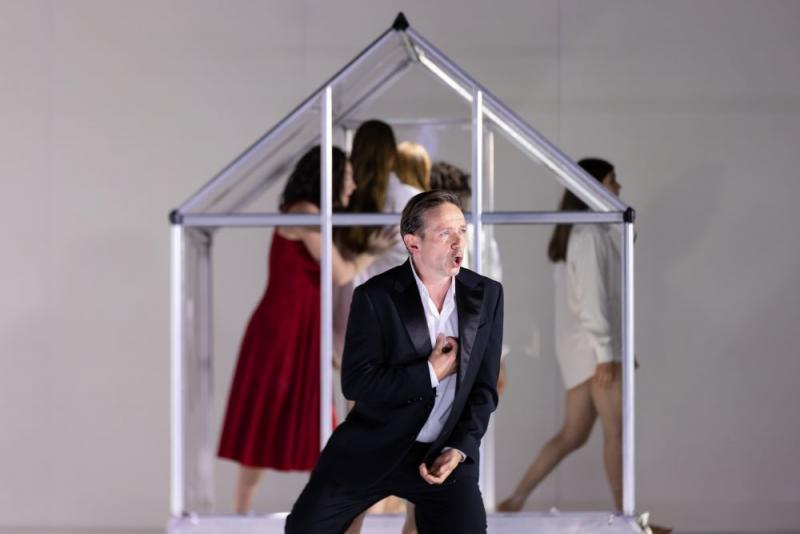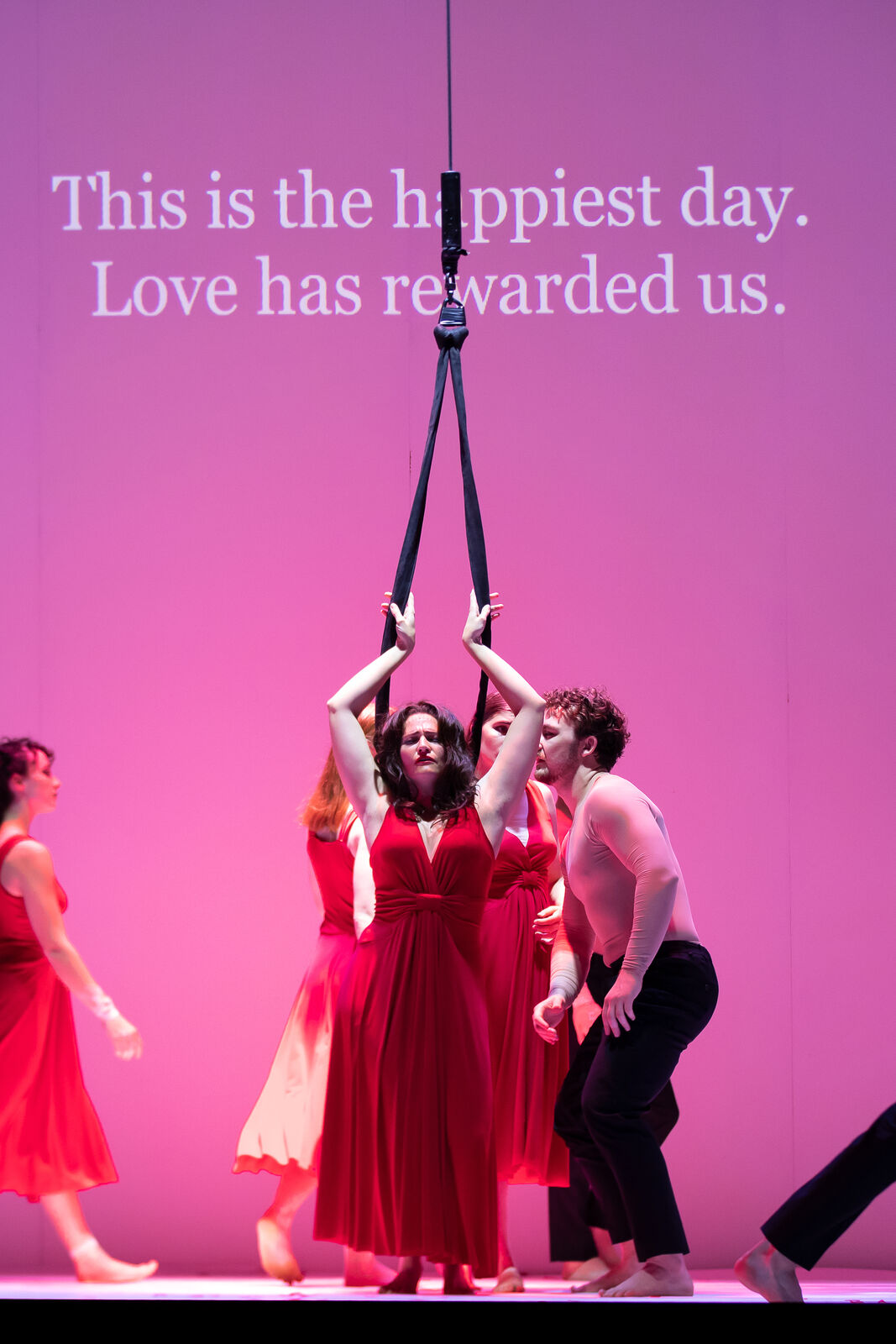Orpheus and Eurydice, Opera Queensland/SCO, Edinburgh International Festival 2025 review - dazzling, but distracting | reviews, news & interviews
Orpheus and Eurydice, Opera Queensland/SCO, Edinburgh International Festival 2025 review - dazzling, but distracting
Orpheus and Eurydice, Opera Queensland/SCO, Edinburgh International Festival 2025 review - dazzling, but distracting
Eye-popping acrobatics don’t always assist in Gluck’s quest for operatic truth

There’s a lot to shout about in this Orpheus, especially the way it looks. In a thin year for staged opera at the Edinburgh International Festival, they’ve gone for an eye-popper with this staging of Gluck’s most influential work. Premiering at Australia’s Opera Queensland in 2019, its star attraction is the Brisbane-based Circa Ensemble, a group of acrobats, circus artists and physical performers whose antics light up the stage.
As the opera begins, we see a solitary female performer suspended from the top of the proscenium who gradually dances, rotates and levitates her way to the stage floor as the overture progresses. That sets the scene for a series of increasingly dazzling performance feats as the opera progresses, sometimes commenting on a scene, sometimes providing an athletic contrast to it.
But how much does it really add to the unfolding drama? The theme of this year’s EIF is The Truth We Seek, and there’s a useful essay in the programme about how, in Orpheus, Gluck sought to restore dramatic truth to opera. So how would he have felt about a set of circus artists taking the attention away from his drama? Some of the acrobatics enrich the story, and they tend to be the more subtle ones. I liked the gentle round dance surrounding Eurydice as Orpheus sings "Che puro ciel", and there’s something creepy about the dancers who crawl over Orpheus in the opening scene, as though embodying the grief and torment that threatens to engulf him.
 Elsewhere, however, a lot of what they do is impressive but distracting. The vertical dancing as Orpheus encounters the Furies is diverting but has little to do with the gravity of the action, and while the collapsing human towers induce gasps from the audience, they take the attention away from Orpheus’ grief in Act 1. More than that, it lets the singers off the hook. Why should they do much acting when the acrobats are doing it all for them? During Act 3, the one point in the story where the human interaction should be at its most acute, the singers playing Orpheus and Eurydice do basically nothing while the dancers behind them get up to all sorts of contortions. That feels like a copout, which they sort of admit by having Orpheus singing "Che faro" straight into the audience with nothing else happening on the stage. That’s the musical heart of the evening, and close to its dramatic heart, too.
Elsewhere, however, a lot of what they do is impressive but distracting. The vertical dancing as Orpheus encounters the Furies is diverting but has little to do with the gravity of the action, and while the collapsing human towers induce gasps from the audience, they take the attention away from Orpheus’ grief in Act 1. More than that, it lets the singers off the hook. Why should they do much acting when the acrobats are doing it all for them? During Act 3, the one point in the story where the human interaction should be at its most acute, the singers playing Orpheus and Eurydice do basically nothing while the dancers behind them get up to all sorts of contortions. That feels like a copout, which they sort of admit by having Orpheus singing "Che faro" straight into the audience with nothing else happening on the stage. That’s the musical heart of the evening, and close to its dramatic heart, too.
As Orpheus, Iestyn Davies sounds ethereal and beautiful, if a little tired by the evening’s end. That might be the venue, though: the Scottish Chamber Orchestra play in the pit and, under Laurence Cummings’ direction, sound lithe and exciting; but they’re dwarfed by the cavernous space of the Edinburgh Playhouse and sound almost comically quiet from the back of the auditorium. The chorus, drawn from Scottish Opera, don’t have much to do, but sing mourners and Furies with aplomb. Samantha Clarke (pictured right) sings both Eurydice and Amor, and brings full-blooded dramatic contrast to Davies’ grieving hero.
The rest of the production is straight, if not particularly interesting. It’s directed and designed by Yaron Lifschitz, Circa’s Artistic Director, who sets it in a white box, and doesn’t have a lot to say beyond his company’s aerial acrobatics, though I enjoyed the moment where Amor turns into a cabaret singer. The ending goes bananas in a way that had me tutting and rolling my eyes: even in distant Australia regietheater has found its place!
Really, therefore, this is an opera that’s almost more about the acrobats than it is about the singers. That makes it appealing and interesting, but also a little jarring. I’m pleased to have seen it because I’ve never seen an opera production quite like it, but I don’t think that’s an altogether bad thing.
rating
Explore topics
Share this article
The future of Arts Journalism
You can stop theartsdesk.com closing!
We urgently need financing to survive. Our fundraising drive has thus far raised £49,000 but we need to reach £100,000 or we will be forced to close. Please contribute here: https://gofund.me/c3f6033d
And if you can forward this information to anyone who might assist, we’d be grateful.

Subscribe to theartsdesk.com
Thank you for continuing to read our work on theartsdesk.com. For unlimited access to every article in its entirety, including our archive of more than 15,000 pieces, we're asking for £5 per month or £40 per year. We feel it's a very good deal, and hope you do too.
To take a subscription now simply click here.
And if you're looking for that extra gift for a friend or family member, why not treat them to a theartsdesk.com gift subscription?
more Opera
 Tosca, Royal Opera review - Ailyn Pérez steps in as the most vivid of divas
Jakub Hrůša’s multicoloured Puccini last night found a soprano to match
Tosca, Royal Opera review - Ailyn Pérez steps in as the most vivid of divas
Jakub Hrůša’s multicoloured Puccini last night found a soprano to match
 Tosca, Welsh National Opera review - a great company reduced to brilliance
The old warhorse made special by the basics
Tosca, Welsh National Opera review - a great company reduced to brilliance
The old warhorse made special by the basics
 BBC Proms: The Marriage of Figaro, Glyndebourne Festival review - merriment and menace
Strong Proms transfer for a robust and affecting show
BBC Proms: The Marriage of Figaro, Glyndebourne Festival review - merriment and menace
Strong Proms transfer for a robust and affecting show
 BBC Proms: Suor Angelica, LSO, Pappano review - earthly passion, heavenly grief
A Sister to remember blesses Puccini's convent tragedy
BBC Proms: Suor Angelica, LSO, Pappano review - earthly passion, heavenly grief
A Sister to remember blesses Puccini's convent tragedy
 Orpheus and Eurydice, Opera Queensland/SCO, Edinburgh International Festival 2025 review - dazzling, but distracting
Eye-popping acrobatics don’t always assist in Gluck’s quest for operatic truth
Orpheus and Eurydice, Opera Queensland/SCO, Edinburgh International Festival 2025 review - dazzling, but distracting
Eye-popping acrobatics don’t always assist in Gluck’s quest for operatic truth
 MARS, Irish National Opera review - silly space oddity with fun stretches
Cast, orchestra and production give Jennifer Walshe’s bold collage their all
MARS, Irish National Opera review - silly space oddity with fun stretches
Cast, orchestra and production give Jennifer Walshe’s bold collage their all
 Káťa Kabanová, Glyndebourne review - emotional concentration in a salle modulable
Janáček superbly done through or in spite of the symbolism
Káťa Kabanová, Glyndebourne review - emotional concentration in a salle modulable
Janáček superbly done through or in spite of the symbolism
 Buxton International Festival 2025 review - a lavish offering of smaller-scale work
Allison Cook stands out in a fascinating integrated double bill of Bernstein and Poulenc
Buxton International Festival 2025 review - a lavish offering of smaller-scale work
Allison Cook stands out in a fascinating integrated double bill of Bernstein and Poulenc
 Tosca, Clonter Opera review - beauty and integrity in miniature
Happy surprises and a convincing interpretation of Puccini for today
Tosca, Clonter Opera review - beauty and integrity in miniature
Happy surprises and a convincing interpretation of Puccini for today
 Hamlet, Buxton International Festival review - how to re-imagine re-imagined Shakespeare
Music comes first in very 19th century, very Romantic, very French operatic creation
Hamlet, Buxton International Festival review - how to re-imagine re-imagined Shakespeare
Music comes first in very 19th century, very Romantic, very French operatic creation
 Falstaff, Glyndebourne review - knockabout and nostalgia in postwar Windsor
A fat knight to remember, and snappy stagecraft, overcome some tedious waits
Falstaff, Glyndebourne review - knockabout and nostalgia in postwar Windsor
A fat knight to remember, and snappy stagecraft, overcome some tedious waits
 Salome, LSO, Pappano, Barbican review - a partnership in a million
Asmik Grigorian is vocal perfection in league with a great conductor and orchestra
Salome, LSO, Pappano, Barbican review - a partnership in a million
Asmik Grigorian is vocal perfection in league with a great conductor and orchestra

Add comment